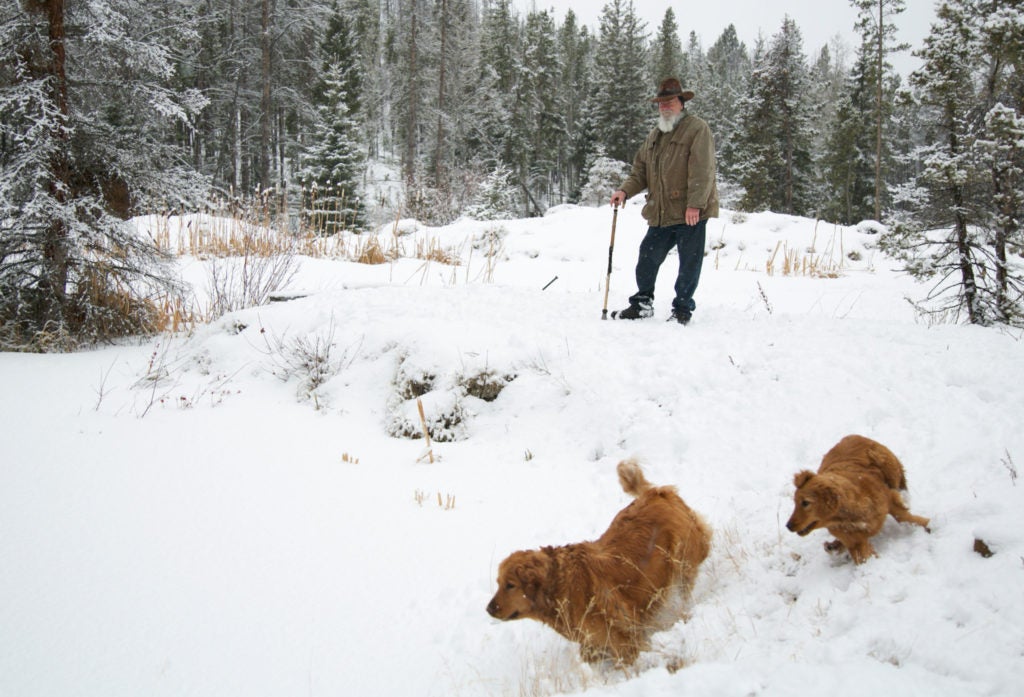
UPDATE: SCOTUS overturned decision upholding Robertson’s conviction and remanded the case so that the indictment could be dismissed and the lien cancelled
(Washington, DC) – Judicial Watch announced today that the Supreme Court of the United States has overturned a lower court decision affirming the conviction of Joseph Robertson, a 78-year-old veteran now deceased who was sentenced to prison for digging ditches on his rural Montana property to protect the area surrounding his home from wildfires. Judicial Watch had filed an amicus curiae brief jointly with the Allied Educational Foundation supporting Robertson and urging Supreme Court review and reversal of the lower court decision. Robertson served 18 months in prison and died while serving probation. He was also fined $130,000, a liability inherited by his estate.
The Supreme Court also remanded Robertson’s conviction to the lower court so the indictment can be dismissed and the lien can be cancelled.
Judicial Watch and the AEF had asked the Supreme Court to review the ruling by the U.S. Court of Appeals for the Ninth Circuit that upheld Robertson’s conviction, because that decision “affirmed illegal agency actions in prosecuting Joseph Robertson based on a misreading of federal law. The Court should take this opportunity to correct the confusion in overbroad interpretations of the Clear Water Act, which have led to unjust prosecutions and federal intrusions into both state authority and individual liberty.”
The brief was filed in the case of Robertson v. United States, Case No. 18-609, 587 U.S. __ (2019). This was an appeal of the Ninth Circuit decision in United States v. Robertson, 875 F.3d 1281, 1285 (9th Cir. 2017).
Judicial Watch asserted in its filing that the ditches Robertson dug “sat on what a federal agency defines as wetlands and were situated on or near a small downhill water flow of about three garden hoses in volume. Mr. Robertson was not engaged in manufacturing or any other industrial activity which would release chemicals or waste into the water, but under the federal Clean Water Act even turning the soil with a shovel can be considered to be releasing a ‘pollutant’ into water.”
In their brief, JW and the AEF suggest that the issue is larger than Robertson’s personal plight, that it also involves the separation of powers among Congress, the Executive Branch and the Supreme Court.
Judicial Watch and AEF also note that the Supreme Court itself has introduced confusion into the issue of “adjacent wetlands,” “point source,” and “navigable waters.
Also, matters like those involving Robertson properly belong with the state, not the federal government.
The brief argues that the Congress has been all too willing to forego its Constitutional duty and defer to federal agencies.
[It was not foreseen that] the judiciary could eventually aid and abet the complete sacrificing of power by one of those two branches, effectively leaving a one-branch government where the founders intended three. When the Court goes too far in reading statutes as broadly assigning sweeping interpretative power to agencies, this allows Congress to give up power altogether and to stop the necessary work of revising and repealing statutes. Congress has proven itself either willing to give up those powers or unable to stop itself from doing so, preferring to ask the executive branch to reinterpret or reimagine statutes in ever more creative ways while sparing members of Congress the pain of accountability for national policy. The Court should not countenance this upending of the constitutional order.
“The Supreme Court has granted a victory against an overreaching government bureaucracy,” Judicial Watch President Tom Fitton said. “The government should not be allowed to regulate every drop of water in America, and the Supreme Court was right to brush back the radical bureaucrats. Mr. Robertson, a veteran, died before he was vindicated but his fight has protected the constitutional freedoms of other Americans.”
The Allied Educational Foundation is a charitable and educational foundation dedicated to improving the quality of life through education. In furtherance of that goal, the Foundation has engaged in a number of projects, which include, but are not limited to, educational and health conferences domestically and abroad. AEF has partnered frequently with Judicial Watch to fight government and judicial corruption and to promote a return to ethics and morality in the nation’s public life.
The story
An elderly veteran who ran a business supplying water to fight forest fires was prosecuted by the federal government and sent to prison for digging ponds on his own property, one of his lawyers says.
Joe Robertson, a Navy veteran from Montana, was 78 when he was convicted and sentenced to 18 months in federal prison and ordered to pay $130,000 in restitution through deductions from his Social Security checks.
His crime?
Robertson, whose business supplied water trucks to Montana firefighters, dug a series of small ponds close to his home in 2013 and 2014. The site was a wooded area near a channel, a foot wide and a foot deep, with two to three garden hoses’ worth of flow, according to court documents.
The U.S. government prosecuted Robertson for digging in proximity to “navigable waters” without a permit, a violation of the Clean Water Act administered by the Environmental Protection Agency and the Army Corps of Engineers.
Tony Francois, a senior attorney with Pacific Legal Foundation, a nonprofit, public interest law firm specializing in property rights, described the events leading up to Robertson’s prosecution during a panel discussion Monday at The Heritage Foundation.
Also on the panel was Kevin Pierce, vice president of Hawkes Co., a Minnesota-based family business that harvests peat for golf course greens. Daren Bakst, Heritage’s senior research fellow for agriculture policy, was moderator of the event, called “Horror Stories of EPA and Corps Overreach under the Clean Water Act.”
Pacific Legal Foundation filed a petition on behalf of Robertson, asking the Supreme Court to review his case, which turns on the definition of “navigable waters.”
The Navy veteran argued that he didn’t violate the Clean Water Act because
digging the ponds did not discharge any soil to navigable waters, since the trickle in the channel didn’t constitute navigable waters.
The largest navigable body of water anywhere near the Robertson home is more than 40 miles away, Francois said.
Because Robertson lived in a wooded area that is “increasingly fire prone,” he was “concerned about the safety and vulnerability of his property,” Francois said. He built the ponds “with a view toward being well-prepared should a fire strike.”
The Supreme Court is expected to decide in April whether it will hear Robertson’s appeal.
Robertson, sentenced in 2016, completed his 18 months behind bars in late 2017.
He was still on parole for the next 20 months when he died March 18 at age 80 of natural causes, according to his widow.
Pacific Legal Foundation filed papers this week to substitute Robertson’s widow, Carri Robertson, as the petitioner in the appeal to the Supreme Court.

Another case Francois cited concerns a proposed road in Marquette County, Michigan. The project, known as CR-595, would shorten the travel time between a nickel mine and a refinery 22 miles away.
The only route now available to the mine, called Eagle Mine, is three times as long, Francois said. The nickel mine, currently the only one in the U.S., is expected to bring about $4 billion in economic activity to the county, according to Pacific Legal Foundation.
The Marquette County Road Commission’s CR-595 proposal called for a direct road from the mine to a refinery.
“The new route would bypass the city of Marquette altogether, eliminate nearly 30 miles of travel per trip, a million and a half miles annually, as well as save 500,000 gallons of fuel per year,” Francois said.
Since the proposed route goes through wetlands, however, the road commission sought a wetlands permit under the Clean Water Act. The state approved the permit, but the EPA rejected it.
“The final version [of the commission’s planned route] proposed to protect 63 acres of wetlands for every acre the road project would disturb,” Francois said. “But the EPA continued to object to CR 595 because in their view the commission still had not provided adequate plans to minimize impacts, and that its 63-1 mitigation ratio was not a comprehensive mitigation plan that would sufficiently compensate for unavoidable impacts.”
The EPA vetoed the commission’s plan and the Supreme Court declined a petition from Pacific Legal Foundation to review that decision.
Pacific Legal Foundation also represented Hawkes Co. in a 2016 case before the high court. In a 8-0 decision, the justices ruled that landowners have a right to challenge wetland determinations made by federal agencies.
Pierce, the Hawkes Co. official, described a difficult and arduous process to prevail over opposition from the Army Corps of Engineers to secure a permit allowing the company to expand on a 200-acre peat mining site. The company began the application process in 2006.
“I really don’t like how it worked. No. 1, there was a lot of fabrication from the Corps people, Pierce said at the Heritage event, adding:
They actually went to the landowner that we had the option to buy the land with. They sent two people up from St. Paul to his house for two and half hours for a meeting to try to convince him to sell the real estate to someone else, while we got $200,000 already invested in a permit application.
And they gave names and numbers of people who would buy it for preservation to sell it out from under us. Well knowing that we had options to buy and contracts with that landowner, which then forced us to have to buy the land seven years before we got our permit and had to follow through on it.
When I confronted them about it, they literally lied to me and said, ‘We didn’t know you had a permit or an option to buy.’ But then later in the conversation, they say, ‘Well, we thought it ran out.’
Congress initially passed the Clean Water Act in 1948, but lawmakers greatly altered and expanded it into the current form with amendments in 1972.
The law “establishes the basic structure for regulating discharges of pollutants into the waters of the United States and regulating quality standards for surface waters,” according to the EPA’s website.
Under the 1972 amendments, it is illegal to discharge any pollutant from a point source into navigable waters without a permit from the EPA. The Corps oversees the permitting process and shares enforcement authority with the EPA.
In 2015, the Obama administration implemented its Clean Water Rule, widely known as the Waters of the United States rule or WOTUS rule, which expanded the regulatory reach of the EPA and the Corps over bodies of water throughout the country.
The Trump administration has taken steps to withdraw the Obama administration’s rule and replace it with a new one that limits the regulatory reach of federal agencies.
Although Heritage’s Bakst said he approves of the Trump administration’s efforts, he has argued that it ultimately falls to Congress to clarify what waterways are subject to EPA regulations.
The Daily Signal sought comment for this report from both the EPA and the Army Corps of Engineers.
“We cannot comment on ongoing litigation even as it pertains to actions of the previous administration,” EPA spokesman James Hewitt said in an email. “However, EPA is moving forward with a replacement WOTUS rule to ensure farmers and ranchers have more certainty when it comes to federal jurisdiction over waters.”
A Corps spokesman said in an email that it would not comment on the Robertson case since it is still active and has nothing to add to the Hawkes case beyond what is already “a matter of public record.”
President Donald Trump needs all of the allies he can find to push through the stone wall he now faces within this divided government. And the best way you can partner with him is by becoming a member of his greatest ally in Washington: The Heritage Foundation.
Kevin Mooney is an investigative reporter for The Daily Signal. Send an email to Kevin. Reproduced with permission. Original can be viewed here.
